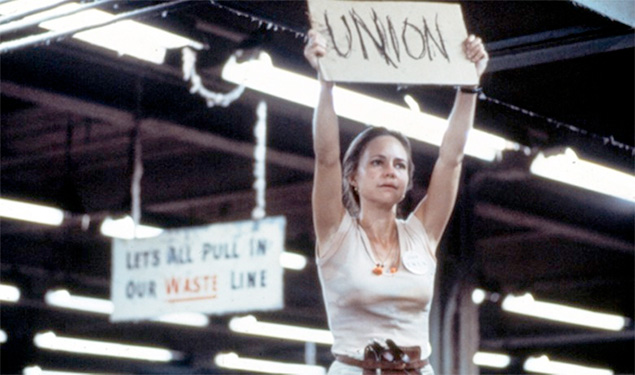Blog
Collective Power Key to Fight Sexual Harassment, Assault

It’s time to fight harder than ever to protect women workers’ right to a collective voice, and to defend a contractually upheld grievance process that has often been the only thing preventing retaliation for reporting sexual misconduct at work.
As #MeToo stories burn across social media, and powerful men face reckoning for the sexual harassment and assault they have committed (sometimes over decades), women in industries less scrutinized by the media, from healthcare to hotels, also have stories to tell. And those women have even less protection from retaliation if they object to sexual harassment or assaults without the collective strength of their co-workers which comes through the representation by a union.
As author Barbara Ehrenreich noted on Twitter this week:
The lesson of the sexual harassment crisis isn’t just about male lust, but about the totalitarian nature of the American workplace, where almost everyone works “at will” — the will of the boss, that is, who can fire you just for having a “bad attitude.”
— Barbara Ehrenreich (@B_Ehrenreich) December 7, 2017
While individual cases of sexual harassment can span the gender spectrum, what the #MeToo movement has shown is how widespread, systemic, and normalized sexual misconduct has historically been toward women. It is a deeply entrenched characteristic of our culture and nowhere is it more destructive than in the workplace. So just imagine how this has played out in the healthcare industry.
Ninety percent of nurses are women. Large numbers of nurses, especially in under staffed hospitals and nursing homes, work night and weekend shifts, frequently removed from colleagues who provide critical backup and an eye witness that are a bulwark against sexual misconduct or other assaults.
In isolated settings and off hours, nurses are particularly assailable from unwanted sexual advances, from not only supervisors, but also from doctors who by their specialties or practice are venerated and protected as revenue generators central to the profit margins of their hospital. In such circumstances, hospital administrators are far more likely to side with the abuser, not the subject of the abuse.
Without the protection of a union, a nurse who objects or files a complaint over sexual harassment or assault is increasingly vulnerable to retribution.
Sexual harassment is a tool of domination, an expression of power, and a vehicle for maintaining power.
For most, sexual harassment and abuse can bring trauma, and a feeling of being defenseless. Often there is an element of shame. And all this is exactly the intent. Sexual harassment divides and isolates.
In the workplace, where livelihood is at stake, it becomes an overwhelmingly oppressive force for a nurse when faced alone. The surest path to real protection is through a strong union and the enforcement of the union contract.
Let’s face it: The 88% of American workers, male and female, who lack a union contract, have NO rights of free speech, assembly or privacy — not even the right to bathroom breaks. Sexual harassment is just the tip of this life-crushing iceberg.
— Barbara Ehrenreich (@B_Ehrenreich) December 8, 2017
An Attack on Unions is An Attack on Women Workers
The power of #MeToo emerges from the acts of many women, acting in unity and collectively acknowledging their own experiences with sexual harassment and abuse. But these actions - as powerful and disruptive of the status quo as they are - are not likely to bring lasting solutions for nurses in non-union workplaces. While the identification of high profile abusers certainly can have a chilling affect, it can also inaccurately lead to a conclusion that this is all about a few bad apples, rather than a deeply rooted hierarchical tool of control that exists in our workplaces and our culture.
For those #MeToo women who have courageously stepped forward in the public eye and identified their harasser, the legal process offers some resolution. But the legal avenue is usually a dead end for a nurse in a non-union setting. Without the protection of a union the nurse is identified as disloyal and a troublemaker. Outside the circle of light cast by #MeToo in the entertainment industry and the political arena, sexual harassment will likely continue in the non-union workplace. There will be no #MeToo for non-union nurses who must face harassment alone in their workplaces.
For nurses the unity and beauty of democracy in the workplace and the strength of collective action are the sources of our empowerment. The Union contract is a direct result of a democratic process in the workplace. It has the power to change the culture of a workplace through a collective focus on and solution to workplace harm. For nurses as well as all working women the attack on unions, embodied in the misleadingly titled “Right To Work” laws, includes a direct attack on the right to collectively defend themselves from workplace sexual harassment. These laws brought by corporate controlled legislators seek to disempower the workplace democracy created by the Union shop; they seek to weaken the unity and adhesion created by the union, and return workers to a position of individual vulnerability.
Hundreds of thousands of nurses throughout the US have fought hard to achieve the right to a union and succeeded. For younger nurses who have never known a work life without a union, “Right to work” laws would be a shocking plunge into the dark ages of rampant sexual harassment and powerlessness against management excesses.
There is no greater threat to the right of nurses and all working women to protect themselves against workplace sexual harassment than the threat of “Right to Work.
Women throughout the US have felt the power of the #MeToo phenomena: it has brought about a shift in the national consciousness. But without a vehicle of power to create and maintain a protective umbrella against sexual harassment, the power of #MeToo will be unsustainable. For working women that vehicle is a union.
